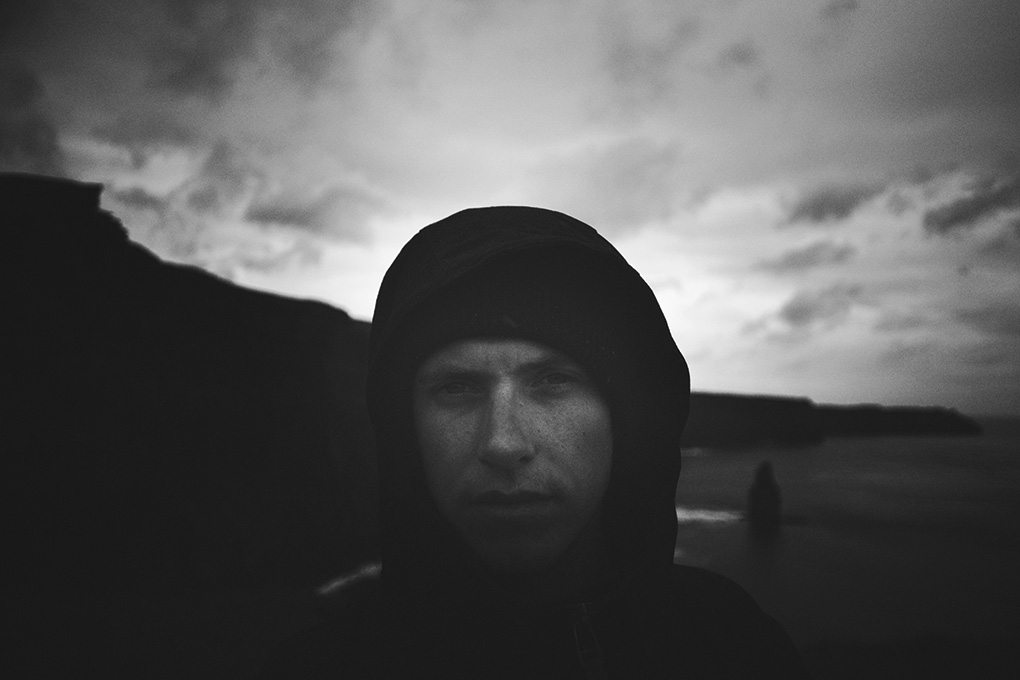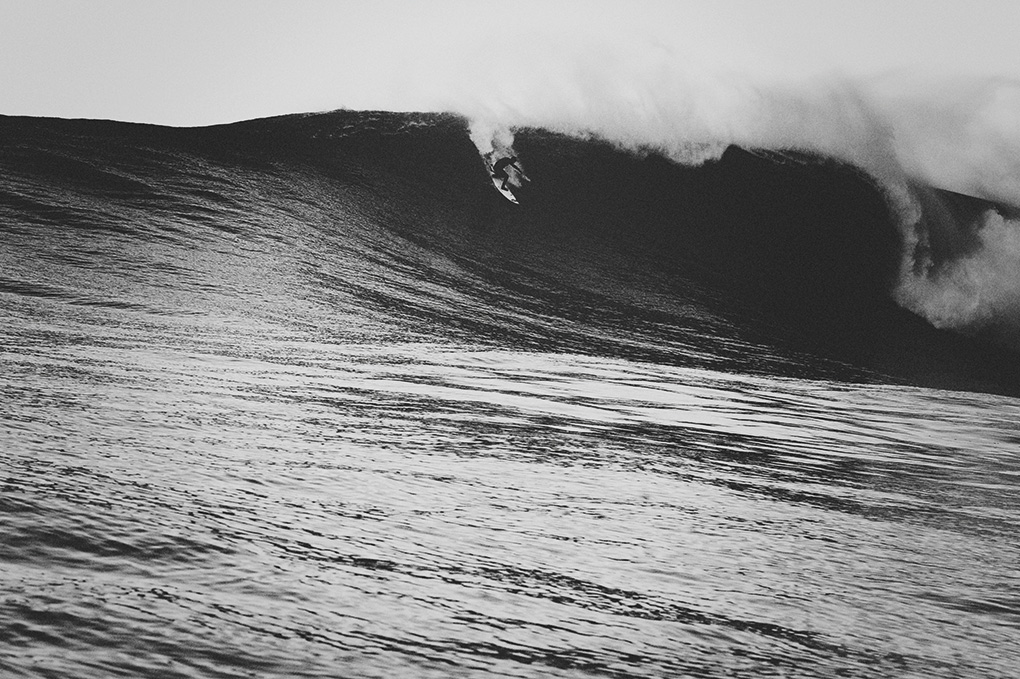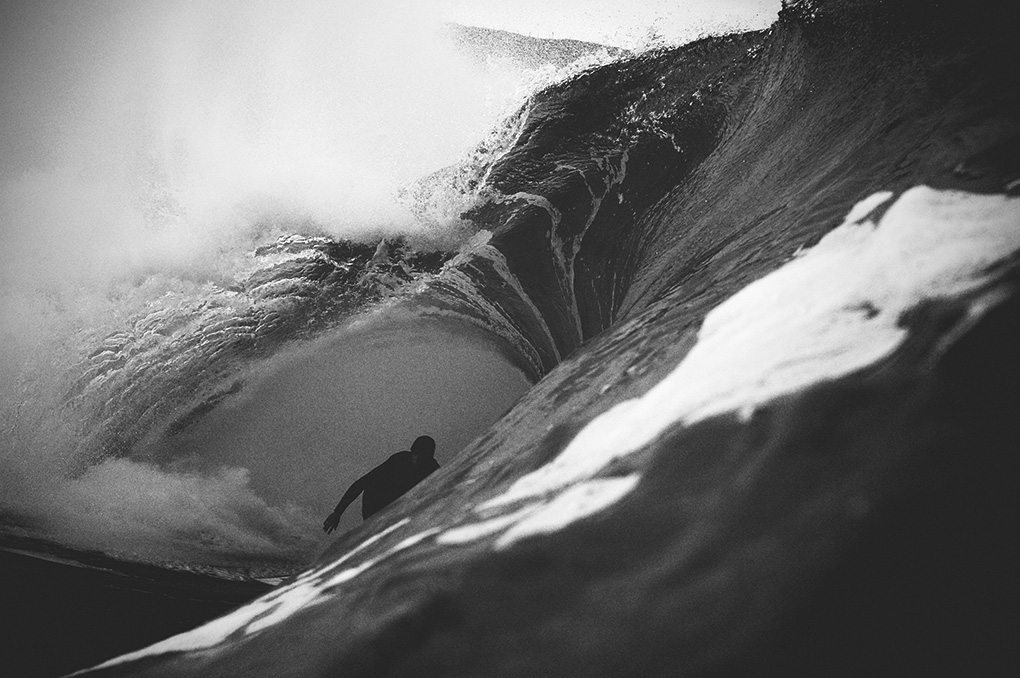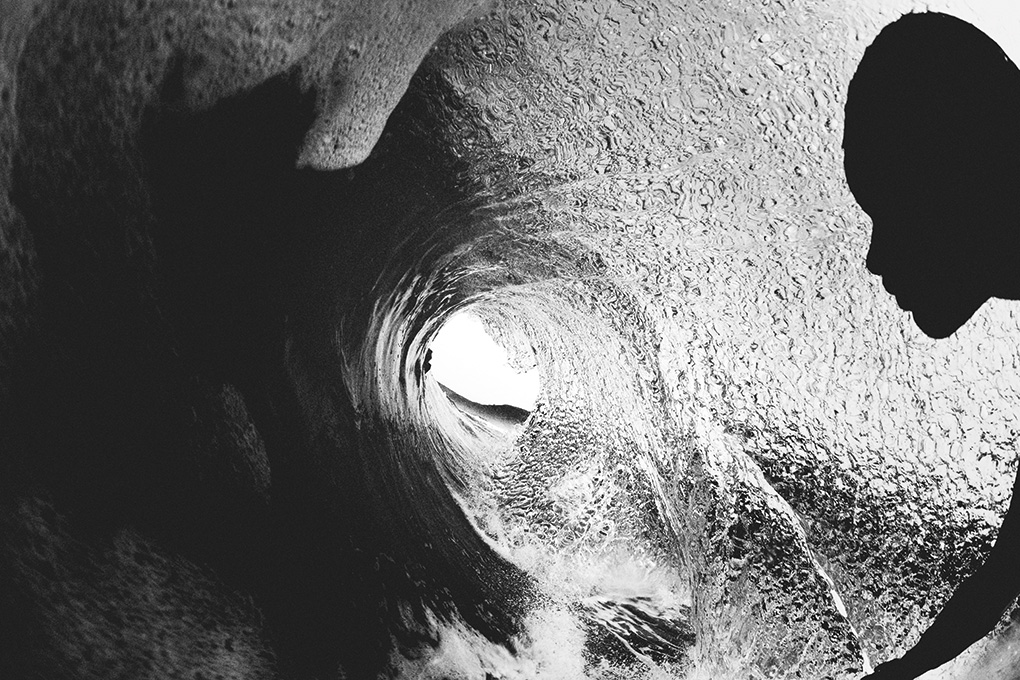Fergal Smith’s Big Idea
On a leafy back lane in West Clare, Ireland, Fergal Smith, in the driver’s seat of his Ford Transit van takes a hearty swig of whiskey straight from the bottle, sighs in satisfaction and wipes his mouth with a grubby sleeve. A brisk onshore breeze is blowing in off a cold, grey sea, which we haven’t looked at yet. It’s shortly after 9am. He dips his dirty penknife into a huge pile of pure white cocaine, and offers it to me. ‘Want some?’

This, is of course, not the case.
Appearances can be so deceptive. Appearances can reveal more about the viewer than the viewee. The whiskey bottle is merely being reused as a water bottle, which he has filled from a well by the side of the lane. Pulled over, leaned under some foliage and filled with the cool, clear H20 that has never been anywhere near a tap, let alone a fluoridation treatment plant. The huge pile of cocaine, while contraband, isn’t in fact narcotic. It’s merely goat’s cheese he’s just taken delivery of, whiter and purer than the driven snow. Unpasteurized goat’s milk and cheese, the sale of which is illegal in Ireland, he instead uses as currency amongst his pals to trade for goods and services. The goats, owned by a friend, just eat grass and flowers in the field, no feed, ever, to produce the lightest, purest tasting cheese you could imagine. In France, they might call it caillé. But this isn’t France, this is Ireland.
And this is all part of Fergal Smith’s big idea.

Rewind to a few days earlier and a chill, blustery early April night, Fergal picks me up from Shannon airport, wearing wellies. He’s a little bit late, for which he’s sorry, he’s tired from a big a day in the garden. We get in his Transit and rattle towards the car park exit, there is untold amounts of crap piled up on the dash, the seat and the floor. Books, clothing, bits of tools, driftwood, glass bottles, flasks, tupperware, packets of seed, sweets, a tin whistle, a 5 month old black collie lab named Bua – Gaelic for to win. It is clear from the man’s dashboard and passenger seat that he does not suffer from OCD or other cleanfreak disorders.
“It’s been a while since I’ve flown out of here,” says Fergal in a sing songy, but not Father Ted caricature Irish voice, a softer maybe more upmarket version. He’s talking about a decision he took a year ago to no longer fly on planes, for environmental reasons. He is a small man, his features quite big for the size of his face. The numbers are generous in proportion to the surface area of the dial, so to speak. His eyes are both raised-brow attentive and lidded at the same time, like a balance of sleepy and engaged. “I decided to stop with the flying, stop getting on planes. I just do pick-ups now.” Diesel chugs smokily out of his aging exhaust at the barrier, without irony. Does he miss going on trips? “I got asked to go to Iceland to shoot a TV commercial recently.” The commercial was for Jagermeister, and featured prominent Brit/Irish surfers. “So I kinda had to ask myself, am I really doing it? Or just sort of doing it? So I decided, nope I’m really doing it.”

With six grand each on the table, it was a fair test of a man’s carbon chaste. Bang went my first theory ‘He’s only doing that since he lost his sponsors.’
“Besides, I’ve not got much time for travels this year, I’m pretty busy in the garden.”
‘Garden’ is something of an understatement. The garden is not just two tracts of land, roughly an acre each, loaned to him by a wealthy benefactor. One, the community garden at Moy Hill, the other, a field for food crops at Moy House. The garden is an idea, a vision. A force for change, much more about people than about plants. It’s about getting folk involved, showing them how they can change they way they live, what and how they eat. It’s organic farming, just as his dad has being doing commercially for the past two decades, only as yet, no real money is involved. “Folk just pitch in and give us hours, and in return we feed them or give em somewhere to stay. It sorta runs on goodwill, good vibes.” The idea is a place for people to work, learn, hang out, eat and play music. It’s not a business, and for the moment Fergal does not want to be tied in to being a producer, rather, a grower. To show people what they themselves can each do, with a bit of know how. A tinge of airy fairy idealism maybe to the cynical ear except… it’s actually working. Working incredibly well. He has seen a farm up for sale nearby, 80 acres of land that could one day make an ideal business, but for now wants to see how well things run on goodwill before large sums of money and loans become involved. Walk before run, garden before farm, so to speak. And for now the garden takes all priority, except of course when the surf is pumping.
-II-
Ferg moved south to Lahinch in County Clare from County Mayo six years ago, also the adopted home of known accomplices Mickey Smith (no relation) and the on off residence (on when there’s swell) of Tom Lowe. “Lahinch is buzzing these days, it’s great.” He observes as we approach. “There’s quite a bit of new energy, which is really cool. But mellow, mellow waves, mellow vibes, there’s no real pro scene as such.” I ask him about The Cliffs, (the spot formerly known as Aileen’s) and specifically something of an international surf brand/ media clusterfuck that went down on a thumping swell early in 2013. The word coming out was Ferg and Tom Lowe, while (somewhat ironically) themselves chief architects of the fame and notoriety of the Cliffs and Riley’s, were less than stoked at the pro and media circus. He chuckles at the suggestion of himself as the bitter, grumpy local. “It actually seems like it’s been less crowded out there recently. Maybe because the winter was super stormy, and we didn’t have many days out there… I don’t know. I guess the Cliffs will take care of themselves.”
“Irish houses are shit.” Fergal explains to me as we make our way home. “ I mean your classic old Irish house, with thick concrete walls full of damp. What you really want is land, but nobody wants to sell good land, they’ll sell you shit land, no probs.”
Fergal has been living with Cornish transplants Mitch Corbett and Matt Smith in a old rented farmhouse at Lackamoor, but recently moved in with his ‘blade’, Sally. He offers me his room, admitting that the sheets are as yet unchanged. If I’m honest, the house is a mess. Sinister black damp grows in the corner of every bit of ceiling, bits of cardboard line the floor. The kitchen is stocked with all manner of dried beans, pulses, grains, spices, 5 kilo sacks of bulk bought health foods, but also looks like it hasn’t seen much in the way of mop, cloth or detergent for several moons. I think it was Charles Bukowski who wrote, ‘Show me a man with a clean kitchen, and nine times out of ten I’ll show you a man with detestable spiritual qualities’. If that is true, it seems the boys’ spirits are intact. There is one warm room with a coal burning stove, but tar drips down the chimney and coats the wall in an evil sludge. There’s no TV, internet and phone reception are part time. It is dark, cramped, drafty, but I can’t think of anywhere I’d rather be staying.

The next day, after a couple of hours throwing mulch down on some onions, we hit Liscannor harbour for more sand. “I used to spend my summers away every year, mainly in Tahiti and WA, he tells me en route. “I’d basically wait in WA and go to Tahiti for swells, that one summer I caught maybe 25 flights whizzing back and forth, went to Fiji for that big swell, and then I hurt my knee in Tahiti and I just started to think about a change of my ways. It seemed pretty selfish, what I was doing. I wanted to live more sustainably, still surfing, but doing something a bit more… wholesome. So I had a dream of, well, kinda what I’m doing now.”
I read on The Inertia that Ferg wanted to be ‘a positive force for change’, and I’ll admit to scoffing at the self- righteousness of it from a distance. But in less than 24 hours with the lad, I’m a convert. Partly because of his demeanour, which has none of the sanctimonious holier-than-thou approach ‘eco-warriors’ can tend to have. Perhaps more than that, he’s not selling you something, he’s just doing it. “I never had Facebook but used to put all that stuff up on my site about Monsanto, etc, like everyone, but at some point I asked myself, what am I actually doing about it? You can go on and on listing evils, but why not just do something positive instead?” Indeed, harping on about evil agribusiness or GM or palm oil or Fukushima can be a bit like the competitive grief phenom social media has wrought upon us. You can do so much on your ‘device’, but Ferg figured you could do much, much more with a spade. We shovel a great mound of sand onto the trailer attached to the back of his “totally illegal, like” van, and talk some more surf.
“The last time I towed was at Teahupoo, on that big swell a couple of years ago. Waited all day just watching this madness. I went out early in the dark. I caught a couple then the tow teams arrived and I watched it all go down. It was total madness, like nothing I’d ever seen. Skis whizzing everywhere, it was just this crazy circus show. There were guys waiting in the channel with 500 dollars in their pocket offering it for one wave. It was horrible. Mark Healey gave me a wave right on dark. Healey was like, ‘Fergal you’ve been sitting there all day and you’re the only guy that hasn’t asked me to get you a wave.’ So I got a pretty solid one, rode it pretty deep and wiped out. That was the last time I towed a wave. I’ve got no plans to tow again anytime soon.”
It’s inevitable that I prod him on the Mullaghmore tow scene of late. “When it’s too big to paddle, Mullaghmore is usually windy and often south west so then it has that crazy lump running thought it and causes it to flap. But that’s not to say it couldn’t be perfect when it’s huge someday.”
That evening, my hands are suitably callused, fingernails suitably mudded and back a touch weary. The pigs have been fed, the rows of onions, leek and potatoes all mulched with sand and seaweed. “Time for a wash off?” We roll into town to behold Lahinch on possibly the worst day of the year. It is 1ft, howling onshore, freezing cold. He skips down the rocks without locking the van, wooden singlefin under arm. The board, made from local wood must weigh a good 15kg. Ferg has never looked happier. He gets the dirt off his hands, rides three waves, offers me the board and heads in. “I never surfed here in the first four years of living here. I was too gnarly, dude! I was hunting the big slabs, man. The big tube! Now I’m frothing when it’s 1 foot slop.”
-III-
“To hell or to Connacht” was the grim ultimatum Oliver Cromwell famously put to the Irish in 1650, in violent attempt to settle by force the barren western coastal province. Fergal’s dad, a native of Wembley, north London opted for the latter, a few years after marrying Fergal’s mother, a native of Catholic West Belfast. With Fergal’s paternal grandad being a C of E vicar, and this being during the grim ’80s Troubles, was crossing the sectarian divide a problem with her family? “I’d imagine a few things were probably said at the time,” Fergal observes. Having something of an atypical background gave Fergal and brother Kevin a relatively unique dialectic outlook on Ireland’s situation. “We’d go back to Belfast with mum and the British Army would stop us and checkpoints, ask to see ID and search the car, then when we’d go with dad and they’d chat about London and wave us on. We’ve seen both sides. We went to protestant primary school and catholic secondary, so we’re sort of both and neither.” When the family first moved to Westport, Co Mayo and Fergal’s dad set up one of the west coast’s first organic farms, his other unusual habits tended to draw attention from the locals. “Dad used to run marathons and train around Mayo, and people would see him and stop and go ‘Where’s the fire?’ Running along roads wasn’t something people did for fun. Then they’d see him doing yoga and thought he was worshipping the devil,” chuckles Ferg.
Fast forward to the mid 2000’s, and Fergal was making strides to becoming the Emerald Isle’s first legit big name pro. Charging hitherto unknown slabs alongside Tom Lowe, the pair along with photog/filmaker Mickey Smith caught the surf world’s attention through incredible magazine imagery and Relentless (an energy drink brand) films, Powers of Three and Lives of the Artists. However, one day when the call came to say the Relentless sponsorship was coming to an end, Fergal felt liberated, rather than poor.” We got a bit fingered with those films we made first of all, in terms of the time we spent and what we got out of it, which was just expenses. Then we got paid just to ride for them for a bit, but for me it was actually a massive relief when it all ended, I was stoked. Lowey was bummed, he tends to worry about money and things, but I just felt amazing. We got paid to surf for a bit, but now we’re free of them. They are basically Coca-Cola, they’re horrible.”
In terms of recent output, Fergal’s clip on his website makes compelling viewing. Compelling because of the quality, but also compelling in that you are compelled to go to his website to watch it. “It took us two years to make a four minute clip. Originally it was supposed to go in the Analog movie, but they wanted just the footage and to edit it with their own music themselves. I wasn’t really into that, so I kept it.” The four minute clip was entered into a surf film festival in Ireland, and won, and the website sponsoring the festival (a UK- based surf forecasting site) wanted to host the clip on their site, as you might expect. Fergal however, took a different view. “I don’t really like surfing websites,” he says with a grin that belies how genuine the sentiment is. “They basically use stuff for their own gain. They weren’t involved in making the clip, they weren’t here. There’s a perception that I’m obliged to hand it over to get views. I’m not bothered about millions of hits. I’d rather fewer people looked at it on my site, but people who are actually interested enough to see what I’m doing. Through that, I’ve meet loads of cool folk who come and look at the blog and learn about the garden and have got in touch, with something to contribute. So anyway, I kinda had a fall out with them (the website).
They sponsored a tow surf contest at Mullaghmore and put my name on the poster and I told them to take it off. On the day, Lowey nearly got killed by a jetski. I wrote about that in an article about the day and they edited it out of the article, which displeased me. Like I said, I’m not crazy about surfing websites.”
Of course, having fierce principles and standing by them is easier done without major sponsors to answer to, but aged 26 and with charging/ tuberiding ability of international acclaim, Fergal is hardly over the hill. In fact, in terms of his own performance, he feels he’s riding waves better than ever. Again, cynics (like me) would point out ‘they all say that’ but with Fergal, there’s something convincing in his delivery that gives you no reason to doubt him. “I just feel really calm in the water, since I’ve not been chasing the pro thing. I’m getting waves early and feeling really poised swooping in to them. There’s not been too many crazy perfect days this winter coz of all storms, but when they’ve come I’ve felt more in tune, less under pressure to get the best one or get a clip. At a certain point, your progression in surfing comes down to how positive your energy towards it is.”
“I was born old. I was born like 50 years old, so I’m 76 now. I’ve always been pretty boring.”
-IV-
“I was born old” laughs Fergal. “I was born like 50 years old, so I’m 76 now. I’ve always been pretty sensible really, boring. I never liked drink- ing, going out when I was a lad. I saw it as poison. I just wanted to get up early and surf. I was never super tal- ented at surfing, I just worked really hard at it and practised. I loved it.”
I ask him about the future, is there a next generation of young Fergals up and down the coast, pulling into icy kegs? Has he inspired a hot bed of Celtic surf talent? He’s not so sure. “There’s one lad who’s real good, he’s young with loads of potential. The trouble is the drink is too much fun here in Ireland. When you’re 16, the drink is a really good time, it’s hard not to get into it. It’s not so much the girls, but the drink.”
The surf forecast looks promising for the few days after I leave, but for the moment, we’re in the community garden, planting out shrubs and herbs, making plans for a rebuild on the shed that fell victim to the big winter storm (nobody actually calls it ‘Hercules’ out loud, do they?). The garden is coming along just fine. Since Holly the pig cleared out the bramble roots, fruit trees have been planted, a central eating area with cob oven is under construction, and all manner of flowers, herbs, fruit bearing shrubs and perennials planted out to give bring to life an area that was for years an overgrown patch of wasteland. The vision is a place where kids can come and learn about growing, a central focus for the community to come and enjoy the bounty of their collective travails. A grant has been awarded for the reconstruction of the shed, not an insignificant sum, and thoughts are being banded around from haybale walls to grass roofs to classroom and cooking areas. The garden has its own well up under some bushes, and Fergal is mid way through explaining the evils of fluoride (he only drinks well water, never mains) when Irene, a lady from across the road appears with plants to donate (roses, blackcurrants, daffs) and introduces herself with words of encouragement.
“Surfers should be the most in tune people with the environment and promoting good living, not part of the problem”
“It’s great that you lads are sanctifying this place,” she says, “It used to be a gibbet.” A gibbet is a place of public execution, often on high ground overlooking a town, bodies of the executed would hang in metal cages for weeks to serve as a warning to the population. Looking at the lie of the land, it’s true, the cul de sac of houses opposite the garden is on the edge of a hill overlooking Lahinch, an ideal execution spot. She tells us about the hand. The hand that comes and taps her and family members on the shoulder in the dead of night. The firm, icy hand of the executioner. And if the community garden helps exorcise the hand, well then more power to it, she thinks. But as a fierce westerly blows in from the low end of the slope, Fergal’s main concern, rather than the spirit world, is whether or not the aromatic herbs have enough shelter in the spot earmarked for them. Assuming that they do, some point later this year, they will be flavouring food grown down at Moy House eaten here by someone who pitched in a bit of time, between surfs, to donate labour to the cause. Labour of course being the one thing organic farming relies on, the thing that makes it largely unprofitable. Much like surfing, it requires serious hours to be put it. But similarly to surfing, the rewards are in the process of putting those hours in, rather than just the end product, be that the first tube ride, or first fork pulling of new spuds.
Irene, so impressed with the garden at her first proper look at it has invited us to her cottage over the road to collect more plants she wants to give to the cause. From the vantage point of her yard, you can see across the town of Lahinch and the hinterland to the east where the 80 acres Fergal has had his eye on lies, still on the market after a few years, still unlikely to be sold anytime soon. The family who owns it aren’t in a rush, he explains. They’re waiting for the right people at the right time. He’s hoping his project might be a means to that end, but not pinning his hopes on it. In the meantime, he’ll reap reward enough from what he’s doing day to day, and from surfing the reefs in between.
“Surfers should be custodians, showing folk the way,” he tells me as we head back down the hill to see if the new swell has shown signs of arriving. “We’re in such a privileged position being close to nature, having an intimate relationship with the elements, we should be the most in tune people to the environment and towards good living, not part of the problem.”
And yet while Ferg goes about realising his big idea, I can’t but wonder if he’d be tempted back into full-time surfing by a massive contract. After all, the way and waves he surfs are box office, he’s an interesting, distinctive character in a sea of bland. What if some brand called you up and said ‘Ferg, we want to pay you loads of money to stay home, get tubed off your head in Ireland, make clips, grow your veg and be cool,’ I ask.
He grins and thinks about it for a moment.
“And be cool? I think that might be pushing it.”
